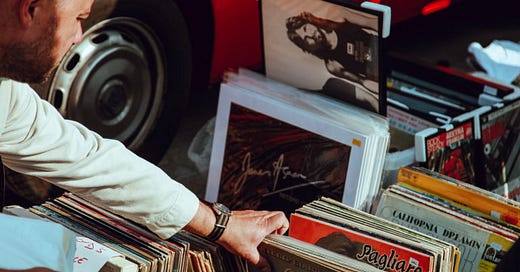
It’s hard for observers of American culture not to be disturbed by some of the societal trends that have picked up steam in recent years.
Tolerance for free speech is in decline while tolerance for dishonesty and hypocrisy (even from our elected leaders) is on the rise. An expanding sense of entitlement and an increased dependence on government have blunted our ingenuity and entrepreneurial spirit. Our attention-spans are on life-support, and though technology has broadened our capacity to communicate, our willingness to actually listen to each other is diminishing every day.
If you thought those things were bad, a writer named Tanya Dracolakis recently drew attention to another troublesome trend: the resurgence of vinyl record collecting.
In a piece for Magnetic Magazine, Dracolakis examines the cultural impact of record sales having risen to their highest point in over two decades, even surpassing the sales of digital music (as hard as that is to believe). Unfortunately, what she describes isn't good.
As someone who got back into vinyl records a few years ago (just prior to their resurgence in popularity), I was stunned to learn just how harmful my purchasing decisions have been. You see, according to Dracolakis, people who buy physical records instead of downloadable digital music are basically shallow jerks who are screwing up American culture with their selfishness and societal insensitivity.
Dracolakis begins her piece by likening record collecting to “hoarding,” which — as anyone who has watched television programs on this lifestyle knows — comes with connotations of psychological problems.
She goes on to explain that “it is worrying to see the rise of regressive materialism in an art form that has always been a driving force of technology and accessibility,” and that "salivating over the accoutrement of record players shows a distinct regard for the material aspects of the music listening experience."
That sounds pretty serious. No wonder she's been “worrying” about it.
According to Dracolakis, the physical packaging of music cheapens the art of music, and by choosing a tangible medium over a digital one, we are submitting to our own vanity. Who knew?
As an author, I was suddenly compelled, while reading Dracolakis's piece, to recognize the inherit virtue in the eBook versions of my novels, as compared to their cocky paperback counterparts.
"Digital consumption and streaming are something to be admired about our generation," Dracolakis writes, effectively answering the years-long question of what good are millennials? She adds, “We no longer desire stacks of CDs in our living rooms, or put our prized possessions on display as conversation pieces or tokens of our taste. There is no ownership of streamed music, there is no showcasing our digital purchases in the living room — we can only share a track by playing it, sending it or sharing the experience."
Boo ownership! While it’s unclear as to whether or not she’s describing digital piracy with that choice of phrasing, breaking the law would of course be a small price to pay for a strong sense of community and the relinquishing of our shallow desire to own things — like 12 by 12-inch squares that we can fill up shelves with.
But let’s not blame the shape of records, or those hokey covers with colorful portraits or photos of smug musicians strumming guitars. As Dracolakis makes clear, the real villain is the material used to make these records…along with the crass, exclusivity that accompanies it: "For the first time, music was freed from the polyester, shellac and polycarbonate of previous media and was accessible to all, equally.”
Equality. That’s always important! It’s hard to believe that I had never thought about such things when browsing through crates in record stores, or kicking my feet up to Johnny Cash’s Walk the Line, as his greatest hits album spun on my turntable. All this time, I had been exercising vinyl-privilege, without showing any regard whatsoever for those who can’t partake in the same purchasing activity (unless they leave their house or go on eBay). What kind of example have I been setting?
Instead of relaxing to the warm, crisp sound of a needle gliding across vinyl, I should have been owning up to my civic responsibility by asking my children to help me figure out how to download individual tracks onto my SmartPhone, and then how to patch them through to some speakers larger than my fist. You know, in the spirit of equality.
Unfortunately, Dracolakis predicts that the problem may persist for a while: “…collectors of material possessions will find their way to confine even the most forward-thinking musical genres to a technology invented in the 1800s."
It’s the ghost of Thomas Edison, still haunting us after all these years. Nikola Tesla tried to warn us about that guy, but did we listen? Nooooo.
So here’s the question: Is there any hope at all for a country that deeply loves music, but doesn’t understand how its choice of mediums can corrupt our collective soul and diminish the obligations we have to future generations? Or are we destined to live in a selfish, disobedient nation that can choose, on an individual basis, how it prefers to listen to music, while arrogantly defending that choice as “no one else’s business”?
Are we really prepared to accept this “different strokes for different folks” attitude? Are we to continue to believe that living in a free society is about something other than free downloads? The madness has to stop. Think of the kids!
It's amazing how a single column can change one's perspective, even on far-reaching topics such as this. It's now clear to me that as a nation, we’ll never stand able…until we retire…the turntable.












